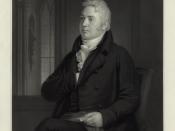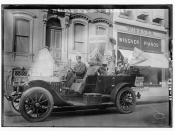The romantic period has been named as one of the most influential literature periods of all time, while also spawning some famous poets such as Robert Browning, William Wordsworth and Samuel Taylor Coleridge. Robert Browning (7 May 1812 - 12 December 1889) was an English poet and playwright whose mastery of dramatic verse, especially dramatic monologues, made him one of the foremost Victorian poets. Browning's, Porphyria's Lover and My Last Duchess are written in the form of dramatic monologue and both explore the issues of race, gender and wealth during the Victorian period. Furthermore, Browning also uses the rise and fall of power to portray women, another aspect which I will investigate later. Browning uses a series of themes and issues including power and wealth to represent the lower or working class in both Porphyrias lover and my last duchess. It is these fundamental aspects that I will use to decrypt the puzzle that Browning has left the world questioning for over a century.
In Porphyrias Lover, Browning's last poem before his death and also argued as one of his most influential and controversial poems, Browning uses the form of a dramatic monologue to tell the story of two lovers. Although its initial publication passed nearly unnoticed and it received little critical attention in the nineteenth century, the poem is now heavily anthologized and much studied. Even from the beginning of the poem, we are exposed to Browning's first representation of class when he wrote " she withdrew the dripping cloak and shawl, and laid her soiled gloves by", this was in fact hinting to the audience by describing the new woman as wealthy and well clothed, both signs of a higher class life style. "Porphyrias Lover", the persona wishes to stop time at a single perfect moment and so...

![[Portrait of Juan Tizol(?) and Lawrence Brown(?), Aquarium, New York, N.Y., ca. Nov. 1946] (LOC)](https://s.writework.com/uploads/7/77189/portrait-juan-tizol-and-lawrence-brown-aquarium-new-york-n-thumb.jpg)
